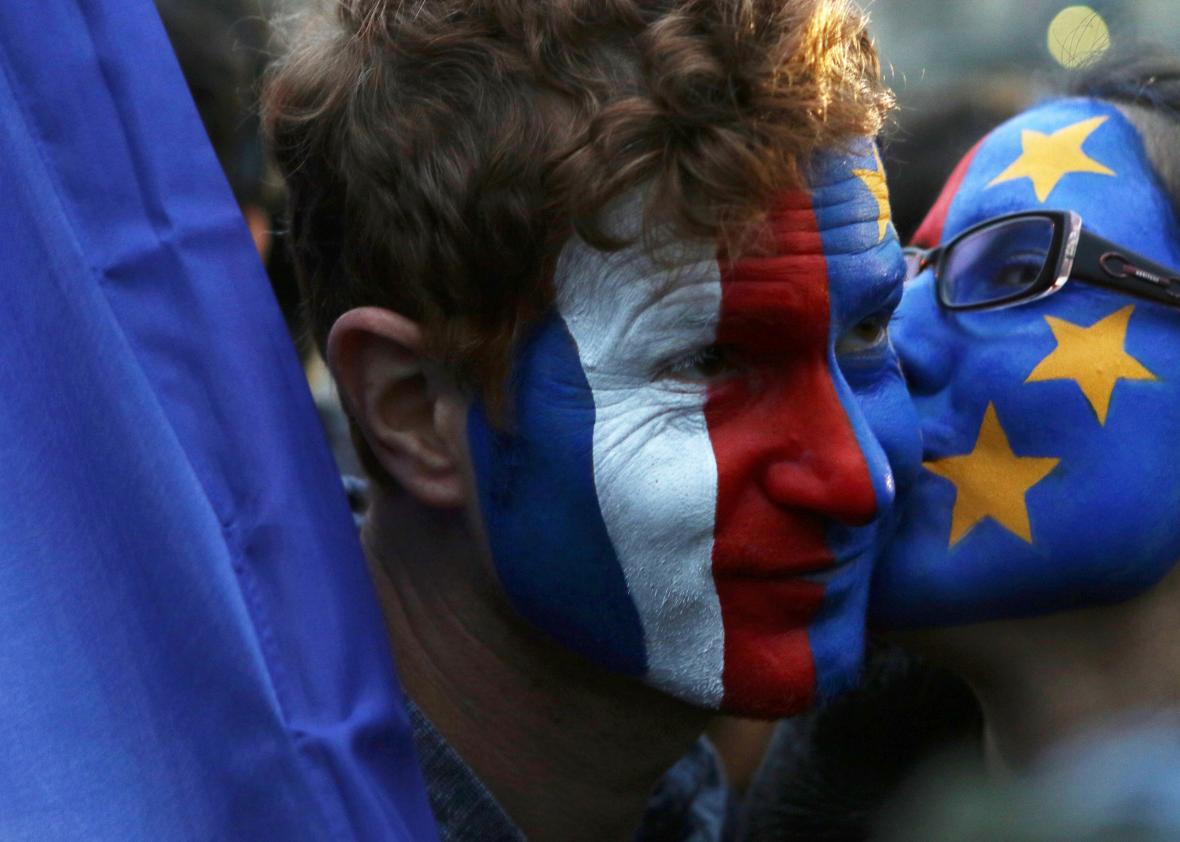As France’s next president, Emmanuel Macron, took the stage outside the Louvre on Sunday night to the strains of Beethoven’s “Ode To Joy,” the European Union anthem, it was easy to view the centrist, pro-EU technocrat’s victory over the right-wing populist Marine Le Pen as an endorsement by the French public of the European project. This would be a little misleading. Between Le Pen, François Fillon, and Jean-Luc Mélenchon—the second-, third-, and fourth-place candidates in the first round of the election—and various fringe parties, more than two-thirds of French voters went for euro-skeptic candidates. Those candidates’ supporters went for Macron in the second round less because of enthusiasm for him than the fact that most of them, though not as many as in previous elections, considered Le Pen unacceptable.
The contradiction at the heart of the EU—that a project dedicated to the spread and promotion of democracy continues despite the will of most Europeans—has not gone away. The project persists in large part because, as the French election demonstrated, its opponents can’t agree on what an alternative should look like. And while it’s still early days, the global political events of the past year may have unexpectedly strengthened the EU by giving it something to stand against.
A few months ago, the EU looked on the verge of collapse. The Greek financial crisis and a massive influx of migrants had opened up fissures between members. Then came Brexit, which European leaders warned could set off a race to the exits. Then came the election of Donald Trump, a president who threatened to abandon the traditional U.S. support for European integration and publicly attacked German Chancellor Angela Merkel while praising Vladimir Putin. All the while, populist, nationalist parties, many with murky links to the Kremlin, were surging in the polls in a number of countries.
But in 2017, the wave has crested a bit. In the Netherlands’ March election, far-right candidate Geert Wilders had a disappointing finish. A pro-European center-right party won parliamentary elections in Bulgaria, and a pro-European president won in EU applicant state Serbia. Merkel appears in good shape ahead for her re-election bid in September, and even if her center-left opponent, Martin Schulz, could squeak out a victory, he’s also a strong backer of European integration.
Brexit will undoubtedly reduce the global economic clout of the union, but it could also make the EU politically stronger by removing one of the staunchest opponents of European integration. For instance, the EU is moving to coordinate defense budgets and military command structures, a process Britain often opposed, viewing it as a back-door means of creating a transnational European army. European governments have also been able to agree on a common negotiating stance over Britain’s exit remarkably quickly. Feeling a little more stable after Macron’s victory, European leaders may be more confident in enforcing tough terms on Britain to dissuade any other wayward members from getting similar ideas.
As for Trump, in practice he has turned out to be neither as anti-Europe or as pro-Russian as Brussels feared. He’s reportedly warming to the idea of striking a trade agreement with Europe rather than the bilateral deals that he, and particularly nationalist adviser Steve Bannon, said he preferred during the campaign.
Trump has had an impact on European politics by providing establishment politicians with a counterexample to run against. Trump and Le Pen have each praised each other, and she even paid a visit to Trump Tower—though not to Trump himself—in January. She even went as far as to describe them as part of a common global movement. But 82 percent of French voters have a negative view of Trump, according to a poll released last week, so it wasn’t exactly surprising to see anti–Le Pen ads warning French voters not to “Trump themselves” or to see Macron touting the support of Barack Obama. A Trump-led movement is not one the French particularly want to be part of.
The European public may still be suspicious of Europe, and European leaders—who are viewed as distant and undemocratic—still need to do a much better job of articulating a positive vision of what they’re for. But thanks to Brexit and Trump, it’s now at least easy for those leaders to articulate what they’re against.
